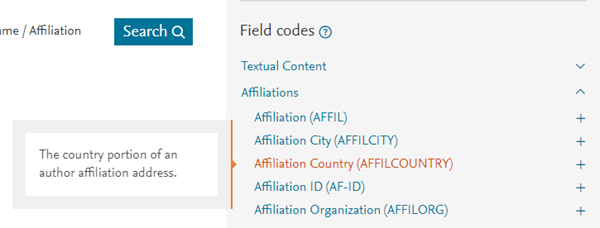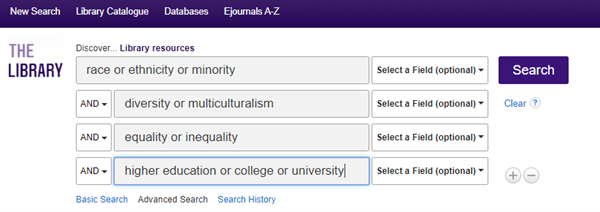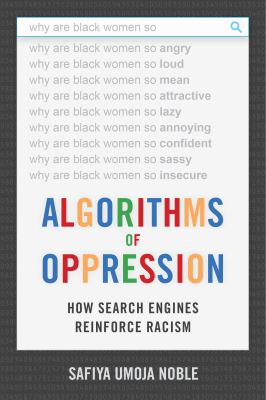Leeds Beckett University - City Campus,
Woodhouse Lane,
LS1 3HE
Searching for inclusive resources
This is a staff guide to searching for inclusive resources.
It's important to note that each subject area will also have books that focus on issues of diversity and equality.
Scopus can be used to source a diverse range of resources for your research. Using the Advanced search options you can search for authors' Affiliation Country to find out the institution the author is associated with.

Using this functionality you can search for research undertaken in your subject area from a range of different countries. Adding the term AFFILCOUNTRY to your search term delivers this functionality. This should help to diversify your research and promote alternative sources to your students.

The Scimago Journal & Country Rank website is a useful tool to measure an individual journal's impact. Using the site you can filter journals in particular subject areas or categories and also filter by regions or individual countries. The journals then can be ranked by their impact or by their H index.
This should help you broaden the possible horizons of your reading list content and research and help to ensure that your reading list is as inclusive as possible.
An example of filtering is looking at Business and International Management journals in the Asiatic Region.

There are over 270,000 print books in Leeds Beckett University's Library. To help people find information they are looking for, books on the Library shelves are arranged according to a numerical classification system. Each book is assigned a number which relates to its subject and locates books on similar topics together. The classification or shelfmark can be seen on the spine of the book.
- 302.23089 Race and Media
- 305 Equality
- 305.8 Race, Ethnicity and Multiculturalism
- 320.011 Equality Political Theory
- 325.3 Colonialism/Postcolonialism
- 344.01133 Discrimination Law
- 796.089 Race and Sport
- 820.99171241 Postcolonial Studies and Literature
Whenever you use a search engine, whether that is Discover, the Library Catalogue or even just Google, the words you use to find the information that you are looking for are always important. Search engines only match words, they don't understand the complex ideas that you may be researching and this is why they don't always retrieve the results you want.
Common challenges when using keywords to search for information are synonyms and homonyms. By using the "advanced search" functionality on Discover, you can be more specific about what you want to search.

Common terms used in academic research include:
Race, Equality, Diversity, Colonialism/Postcolonialism, Cross-Cultural Studies, Ethnography, Diaspora
Different subject areas may have specific terms to refer to similar topics. These can be terms such as:
BAME (Black, Asian and minority ethnic), BME (Black and minority ethnic), BRICS (Brazil, Russia, India, China and South Africa)
There are numerous Research Centres which focus on equality and inclusivity issues. Here is a small selection of them:
Search engines like Google use relevance algorithms to decide what information to show you in your results list. These algorithms are often hidden and may reflect institutionalised bias.
One way of limiting or mitigating the influence of algorithms is by using the advanced search functionality to control how a search engine finds results for you.
You can find more information on this topic in Algorithms of Oppression by Safiya Umoja Noble.


